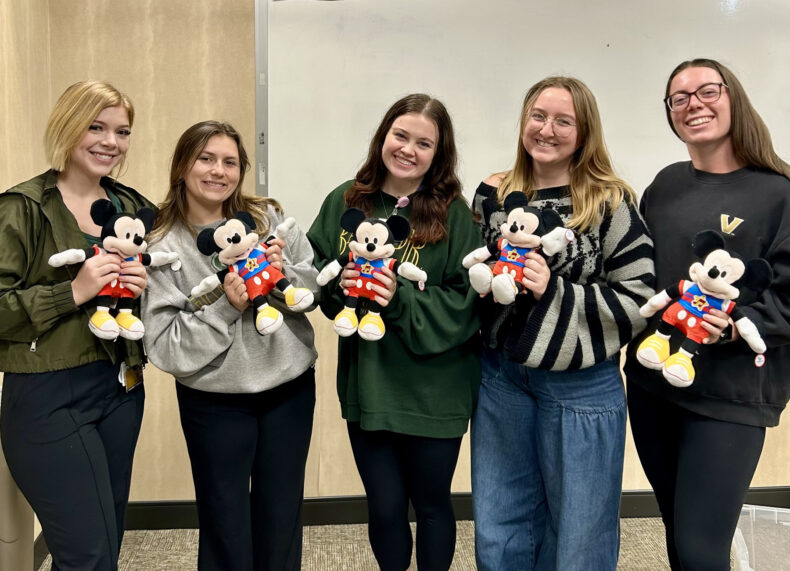
by Kelsey Herbers
Vanderbilt University Medical Center’s Department of Hearing and Speech Sciences in the Vanderbilt Bill Wilkerson Center recently hosted an adapted toy workshop to create a loaner library of toys that are accessible for children with physical disabilities.
The event was organized by FairPlay, an organization founded by Christina Grisanzio, a student in the Master of Science (MS) in Speech-Language Pathology program, who learned of the need for more equitable access to play for children with physical disabilities while interacting with patients in the Vanderbilt Bill Wilkerson pediatric outpatient clinic.
Many interactive toys bought off the shelf require fine motor movements for use, such as squeezing the paw of a plush toy to make it talk or pressing small buttons to cause movement or flashes of light.
While toys that are designed specifically for children with fine motor impairments exist, they often cost three to four times the price of off-the-shelf toys, with a single accessible toy costing families between $60-$200. Financial barriers can prevent families from accessing toys their children can use to play and develop.
With tools such as a hot glue gun, scissors, a drill and some wire, off-the-shelf toys can be adapted by connecting their internal circuits to a larger switch that can be operated by other parts of the body, such as the head, feet or knees. With practice, a store-bought toy can often be adapted in less than 20 minutes for under $1.

“The FairPlay team is working to build a library system that allows children with physical disabilities to enjoy the benefits of playing with a broad selection of adapted toys. Given children’s quickly changing taste in toys and the discretionary nature of the cost, children with disabilities tend not to have adequate access to play,” said Grisanzio.
“When generous volunteers adapt the toys for our libraries through our workshop, we circumvent high market prices, leaving us with more resources to purchase toys and switches. Volunteers also gain valuable skills that they can use to adapt toys for their families, patients and communities in the future.”
The workshop was led by Ezra Reynolds, an adapted toy specialist, and Kim Lilley, executive director of Tennessee’s Technology Access Program, with additional assistance provided by Vanderbilt University’s Department of Biomedical Engineering.
Attendees modified plush toys, lava lamps, bubble blowers and fans to create a new library of toys that can be taken home by families who are accessing therapy through Vanderbilt’s Bill Wilkerson Center.
“I am continuously amazed at the creativity and generosity of our staff and students,” said Anne Marie Tharpe, PhD, chair of the Department of Hearing and Speech Sciences and associate director of the Vanderbilt Bill Wilkerson Center.
“Making these toys accessible to children who otherwise would have limited ability to interact with them was a wonderful gift for the children and their families.”
The adaptive process is also translatable to items adults use, including television remotes and switches on portable fans. Learning to control toys with switches can also translate to skills in accessing communication devices, such as iPads and computers, helping children gain competencies that may be helpful for future employment.











